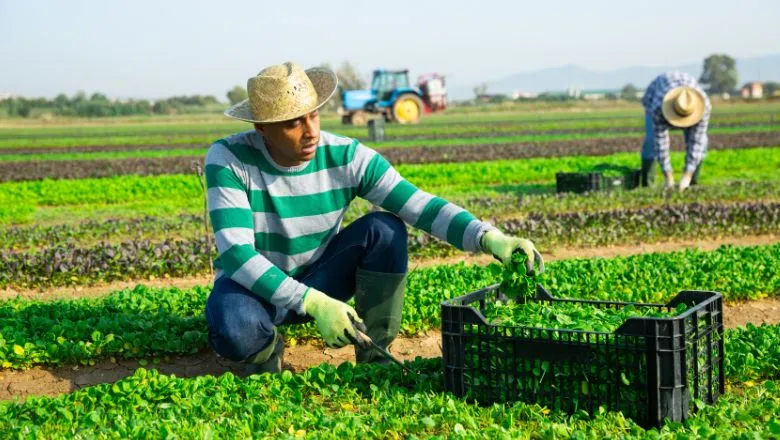Agricultural Labor and the H-2A Program

Farm Management Resources
Regardless of what industry you are in, having a skilled and dependable workforce is the foundation of a successful business. Farmers rely on skilled workers, both seasonally and year-round, to produce the safe and abundant food supply on which Americans and our global trade partners depend. However, with fewer Americans growing up on farms or even having direct exposure to the agriculture industry, it is increasingly difficult to find American workers interested in farm work. Farmers must increasingly turn to the H-2A guest worker visas program to fill their labor needs and ensure the viability of their operation. Relying on a foreign visa program is never a farmer’s first choice, but it has become a necessary solution to the shortage of workers here in the United States and has proven to be mutually beneficial to farmers and employees alike. If you are considering the H-2A program for your farm, this article will provide an overview of the program and how it may fit into your operation.
What is the H-2A Program?
The H-2A program provides an opportunity for U.S. employers to hire foreign workers to fill temporary or seasonal agricultural positions. It is important to note that H-2A workers do not have an adverse effect on or displace American workers. H-2A employers must first recruit and preferentially hire U.S. workers before they are awarded visas to hire H-2A workers. Employers must document and retain the names of each U.S. worker who applied for a job and complete a report on why the job was not able to be filled domestically. Even after an employer hires H-2A workers, they must continue to work with the state workforce agency (Virginia Employment Commission) and hire any U.S. workers who come forward until 50% of the work period is completed.
Employers in Virginia must pay H-2A workers at least the 2024 Adverse Effect Wage Rate (AEWR) of $15.81 per hour. This is more than double the U.S. federal minimum wage of $7.75/hr. and higher than the 2024 Virginia minimum wage of $12/hr. The H-2A program is by no means inexpensive for an employer as they must also pay for each worker’s housing free of charge, and their transportation from and back to their home country. If any domestic workers are hired to perform similar duties to the H-2A workers, they must also receive the same terms and conditions of the H-2A contract. The costs of the program are often worth it to the farmer who is paying for skilled and reliable labor to fill their need. For the workers, they are given a guaranteed contract and a pay rate that is often higher per hour through the H-2A program than per day in their home country.
How does a farmer get started with H-2A
If your operation is struggling to find American workers to fill available positions, you will begin a process with the US Department of Labor (DOL). The standard filing process for hiring H-2A workers should take between 60 and 75 calendar days and will include the following steps:
- The farmer applies for a domestic job order with the local State Workforce Agency (VA Employment Commission) between 60 and 75 calendar days before the date they need work to start.
- The farmer applies for a temporary labor certification with the Department of Labor’s Office of Foreign Labor Certification at least 45 calendar days before the date they need work to start.
- Department of Labor’s Office of Foreign Labor Certification provides the farmer with its final determination.
- The farmer completes an H-2A visa petition with US Citizenship and Immigration Services.
- Workers apply for the H-2A visa with the Department of State and complete consulate interviews. Potential workers from most counties in the western hemisphere and Europe are eligible. In total, workers from 87 countries are eligible for H-2A.
- Approved workers travel to the worksite and arrive on the start date with an arrival/departure record.
Solutions for Ag Labor Reform and Workforce Stability
The H-2A program is an effective option for many farms in need of labor and provides a valuable opportunity for workers. Like the H-2A program, Virginia Farm Bureau supports proposals that provide access to a legal and stable workforce for agriculture’s needs now and in the future. However, as labor shortages persist and the H-2A program becomes increasingly expensive, the agriculture industry needs significant reform to the H-2A program that provides flexibility for employers and workers by allowing employment options that address both seasonal and year-round needs and a reasonable and mutually agreeable wage rate.
Farm Bureau believes that long-term workforce stability will come through a more streamlined and flexible H-2A visa program. In addition to temporary and seasonal opportunities, workers should have the ability to continue with an employer for as long as the employer has a need – up to three years. This allows farmers who have year-round labor needs to use the program and avoid disrupting their essential business operations and gives workers a longer horizon of employment stability. This program should recognize real-life workforce challenges and provides the flexibility and stability that most domestic workers enjoy.
The H-2A program is a valuable program for the agriculture industry, however, reform to our guest worker program is long overdue, as ongoing workforce shortages place the long-term stability of our food supply at risk. It is time we work toward solutions that provide farmers and workers with the long-term stability they need. Instability in the agricultural workforce places domestic food production at risk. We call on Congress to pass responsible farm labor legislation to deliver the certainty farmers need to continue producing affordable food for America’s families.
State specific resources:
Upcoming Agriculture Labor Forum – Virginia Agribusiness Council - https://va-agribusiness.org/event-5826197

Author:
Ben Rowe - Virginia Farm Bureau